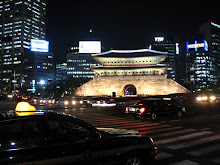By Tracey Stark
When Oleg Kiriyanov was ready for college in 1991, the Soviet Union had just celebrated a year of formalized relations with South Korea. This changed not only the course of history, but young Oleg's life as well.
Almost 15 years later Russian journalist Kiriyanov can say he has been a witness to it all.
"There was a lot of excitement about Korea, so I decided to study the language at St. Petersburg University." Because of the USSR's relationship with North Korea to that point, the Korean language was a well-established field of study.

In 1994 he decided to take it to the next level so he came to Korea to study International Relations at Seoul National University. In the six years that followed he collected both a bachelor's and master's degree and wrote his thesis entirely in Korean.
If someone had told him when he was a child that he would be in Korea for more than a quarter of his life by age 30, he would have laughed because he had another dream from the time he was 7. "I wanted to be a military officer and was planning to enter Military Academy - nothing related to Korea. But my eyesight was not good enough and I failed the medical check up so I had to change all my life plans."
After graduating from SNU he had to find a way to put his degree to good use. The business climate in Russia was still very difficult, so he opted to try his hand as a foreign correspondent in Seoul.
"It was kind of an experiment," Kiriyanov says. Two years later and he says it's still up in the air.
But the opportunities his life here has afforded him could not have easily been duplicated in Russia.
As a fluent speaker of Korean he's able to cover the same stories as the Korean press. As a holder of a foreign passport he's invited on the foreign press junkets, like a recent Gaeseong Industrial Park trip and the first outing for foreigners in recent years to Dokdo Island last April.
Among other things Kiriyanov has been able to do as a fluent Korean speaker and foreign journalist were to train with the Korean Army (including parachute training, though, regretfully, he wasn't allowed to jump) and to go out for a day's work with squid fishermen in the East Sea.
Yet the one negative aspect he can find about life in Korea has to do with his job.
"I'm only one man here, so it's difficult to cover everything I need to cover." Besides Kiriyanov there is only one other Russian journalist in Korea and he works for a separate news organization.
But he does love his job. "It's quite flexible. My office is my home," he says, then adds with a smile, "and the closest bureau chief is 9,000 kilometers away in Moscow."
His main purpose here, he says, is to bridge the cultural gap between Russia and Korea through his writing.
"Most people in Russia don't know about Korea. They think I'm here working for Kim Jong-il," he laughs. "But Koreans don't know much about Russia either. There is no big picture."
As Russiskaya Gazeta is a government-run newspaper, his priority is to cover issues that have a direct impact on Russia or involve Russians in Korea.
One such event was the APEC summit. But he wouldn't end up covering it as a journalist.
"There was a shortage of Korean speakers in Russia, so I was 'rented out' to President Putin's press people," Kiriyanov says.
Over the years he has seen big changes in Korea.
"Basically I felt the change of the attitude towards foreigners. At the beginning sometimes I felt like a being from another planet, but gradually that changed, more foreigners came," Kiriyanov says. "At the beginning when I talked to my Russian friends many Koreans thought it was English, but not now."
After living in Korea for almost eight years, he says he even thinks like a Korean.
"When friends ask me 'why do Koreans do that?' I sometimes don't see any other way," he says with a laugh.
Of course Kiriyanov misses Russia, he says. His family and friends are there and the country is so vast and beautiful.
"I miss the sense of distance in Russia. I mean, 400 to 500 km is not a distance at all but here it's the end of the country." He looks up as if to capture a memory. "And I like enjoying nature without being crowded with people. That's why I probably like traveling to Siberia."
Kiriyanov likes his life in Korea. He has a lot of Korean friends, including some he has known for more than 10 years. He has no language problem and an interesting job.
"You know sometimes I have a strange feeling like I have two homes: here I miss Russia, in Russia I miss Korea."
After Korea? Kiriyanov hopes for another assignment in Asia. Maybe Japan, since he speaks a little of that language as well.
 Enchiladas at Margarita Bar & Grill
Enchiladas at Margarita Bar & Grill

